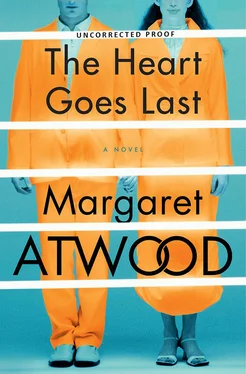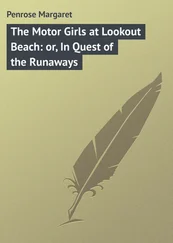She parks the scooter in the lot behind the pharmacy, then walks around to the front. Already her heart is beating faster. She takes a breath, assumes her bustling, efficient pose, consults her little notebook as if there’s something written in it. Then she orders a large box of gauze bandages, putting it on the hospital account. The bandages aren’t needed, but they’re also not remarkable: no one will be keeping track of gauze bandages, especially since keeping track of them happens to be her own job, every other month.
She smiles in her sunniest manner at Bill Nairn, who’s putting in his last hour as pharmacist before shedding his white coat and taking up whatever role he plays inside the Positron Prison walls. Bill smiles back, and they exchange remarks about the lovely weather, then close with goodbyes. She smiles again: she has such guileless teeth: asexual teeth, nothing fanged about them. She used to worry about looking so symmetrical, so blond, but she’s come to think of this as an asset. Her small teeth alarm no one: bland is good camouflage.
She hurries back to the lot, and sure enough there’s a small envelope tucked in under the scooter seat. She palms it, fishtails out of the lot, makes it around the corner to a residential street, parks.
They don’t use their Consilience-issue cellphones to arrange these meetings: it’s too risky, because you never know what the central IT people are tracking. The whole town is under a bell jar: communications can be exchanged inside it, but no words get in or out except through approved gateways. No whines, no complaints, no tattling, no whistle-blowing. The overall message must be tightly controlled: the outside world must be assured that the Consilience/Positron twin city project is working.
And it is working, because look: safe streets, no homelessness, jobs for all!
Though there were some bumps along the way, and those bumps had to be flattened out. But right now Charmaine doesn’t intend to dwell on those discouraging bumps, or on the nature of the flattening.
She unfolds the paper, reads the address. She’ll dispose of the note by burning it, though not out here in the open: a woman on a scooter setting fire to something might attract notice. There aren’t any black cars in view, but it’s rumoured that Surveillance can see around corners.
Today’s address is in a housing development left over from some decade in the mid-twentieth century: one of the many relics from the town’s past. As they’ve all been informed in the backgrounders, the town that’s now become Consilience was founded in the late nineteenth century by a group of Quakers. Brotherly love was what they’d wanted; the town’s name was Harmony, its crest was a beehive, meaning cooperative labour. The first industry was a beet-sugar mill; next came a furniture factory, then a corset company. Then there was an automobile plant – one of those pre-Ford cars – then a camera film corporation, and finally, a state correctional institution.
After the Second World War, the key industries faded until nothing was left of Harmony but a gutted downtown, several crumbling public buildings with white columns, and a lot of repossessed houses not even the banks could sell. And, of course, the correctional institution, which was where the inhabitants had worked, when they’d worked at all.
But now, thinks Charmaine, it’s all different. Such an improvement! Already the gym has been renovated, for instance. And a whole bunch of houses are being upgraded – a fresh batch of applicants will arrive any month now to fill them. Or maybe to fill the houses that aren’t so upgraded, such as the one she and Stan had lived in at first. There had been plumbing problems; more like plumbing events , since they were bigger than mere problems. There was the time when it rained so hard and the sewage came spouting up through the kitchen sink: that was bigger than just a problem.
Luckily they’d been approved for a transfer; she assumes their Alternates had moved to the new house as well, but maybe not. She hasn’t thought to ask Max about that – whether he and his wife once lived in that earlier house. It isn’t the kind of thing she talks about with Max.
Every month it’s a new address: better that way. Luckily there are a lot of vacant houses, left over from when the industries were failing and the lenders were foreclosing, and from that later time when so many houses were standing empty because no one wanted to buy them. Max is a member of the Consilience Dwellings Reclamation Team when he’s not living in his prison cell at Positron. The Reclamation Team are the ones who inspect the houses, then tag them either for the wrecking ball and levelling for parkland and community gardens, or else for renovation, so he’s in a position to know which ones are suitable.
Max tries to choose the kind of interior decoration Charmaine prefers: she likes pretty wallpaper, with rosebuds or daisies. He does find the ones with wallpaper like that. But in each house they’ve used, the vandals were there, in the times when they roamed from town to town and from house to house, smashing windows and bottles and drinking and drugging and sleeping on the floor and using the bathtubs as outhouses. That was before they started the Positron Project and put up the walls around Consilience.
The gangs and crazies left their marks on the floral wallpaper: scrawled tags and other things. Vicious drawings. Short, hard words, written in spray paint, or markers, or lipstick, and, a couple of times, something brown and crusted that might have been shit.
“Read to me,” Max had whispered into her ear, in the first house, the first time.
“I can’t,” she said. “I don’t want to.”
“Yes, you do,” Max said. “You do want to.” And she must have wanted to, because those words were spilling out of her mouth. He laughed, picked her up, pushed his hands up under her skirt. She never wears jeans to these meetings, and that’s why. The next minute they were down on the bare floorboards.
“Wait!” she said, gasping with pleasure. “Undo the buttons!”
“I can’t wait,” he said, and it was true, he couldn’t wait, and because he couldn’t, and neither could she. It was like the copy on the back of the most lurid novel in the limited-titles library at Positron. Swept away. Drugged with desire. Like a cyclone. Helpless moaning. All of that. She’d never known about such a force, such an energy. She’d thought it was only in books and TV, or else for other people.
She gathered the buttons up afterwards, pocketed them. Only two had come off. She sewed them on again, later, after her stint in Positron, before returning to the house where she lived with Stan.
She did love Stan, but it was different. A different kind of love. Trusting, sedate. It went with pet fish, in fishbowls – not that they had one of those – and with cats, perhaps. And with eggs for breakfast, poached, snuggled inside their individual poachers. And with babies.
Once Grandma Win had died, Charmaine had to make her own way; it had been thin ice with the cracks showing and disaster always waiting just beneath her, but the trick was to keep gliding. She loved Stan because she liked solid ground under her feet, non-reflective surfaces, movies with neat endings. Closure, they called it. She’d opted for Chief Medications Administrator at Positron Prison when it was offered to her because it involved shelves and inventories, and everything in its place.
Or that’s all she thought it would be; but there are depths, as it turns out. There are other duties not mentioned to her at first, there’s a certain amount of untidiness, there’s navigation to be done. She’s getting proficient at it. And it turns out she’s not as dedicated to tidiness as she used to think.
Читать дальше












